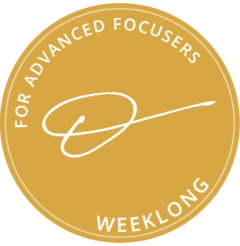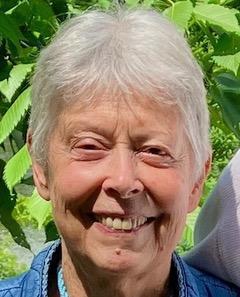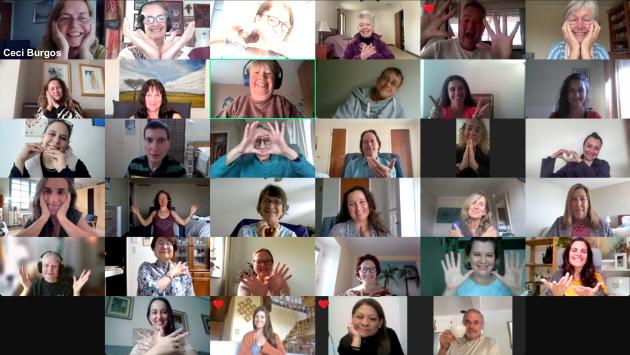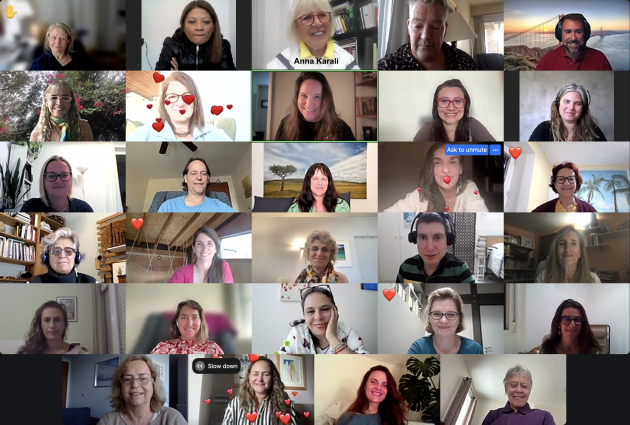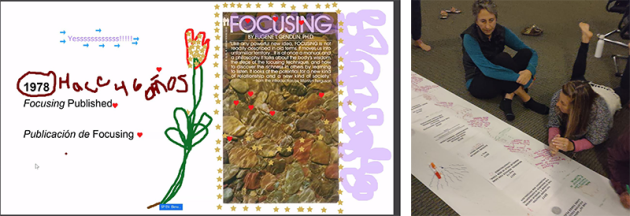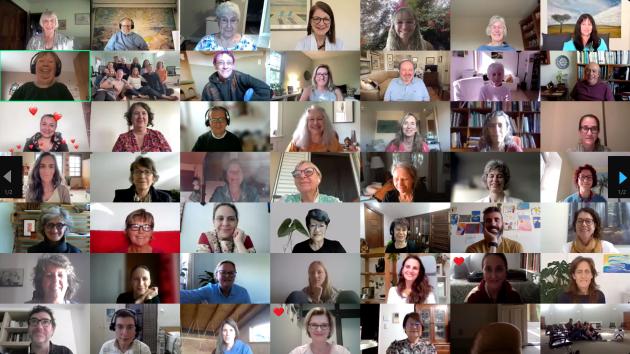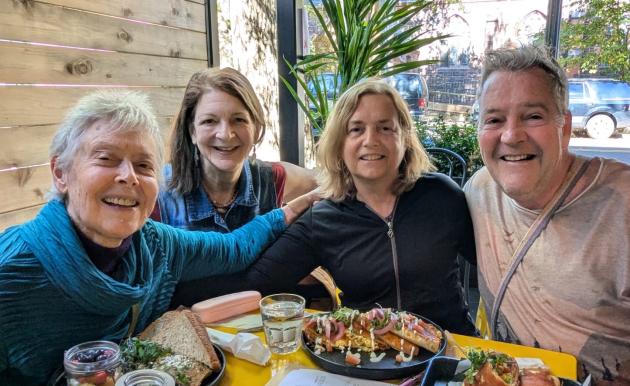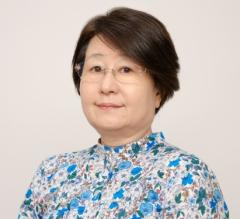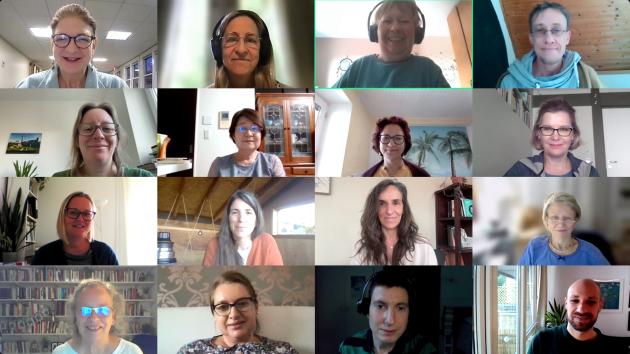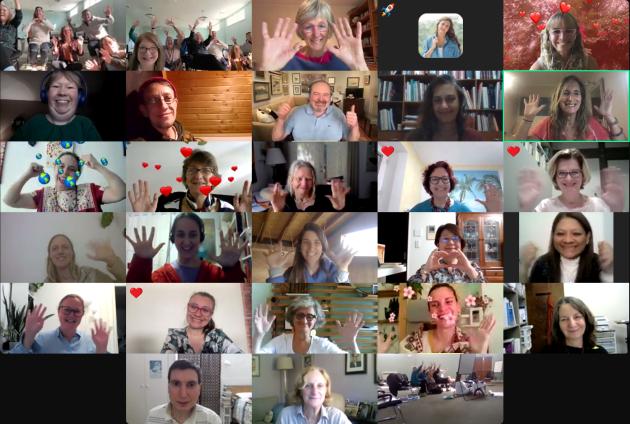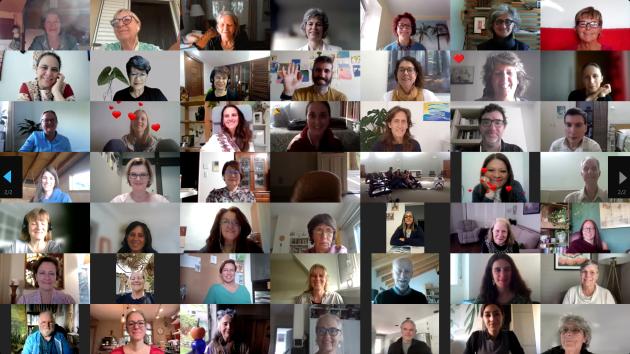Impressions of the Weeklong by Beatrice Blake
Thinking back, I’m pretty sure this was the 10th Weeklong I’ve been to, and as far as I’m concerned, it was the best! I feel that the worldwide Focusing community has matured a lot, in the sense that we are ready and able to live Focusing, and we Coordinators are finding ways to make our presentations more experiential. All this gives us the chance to experience Gene Gendlin’s philosophy rather than just talking about it.
We were very grateful to Nada Lou for giving us permission to use a clip from her wonderful memorial video of Gene.
Our leadership team this year was Ceci Burgos from Argentina, René Veugelers from the Netherlands, and yours truly, Beatrice Blake, from the US. Building on the theme that we presented last year in Dublin when Tom Larkin was part of the team, we continued to explore the ideas that Gene presents in his 1993 article, “Three Assertions about the Body.” The three assertions are:
1. The body knows our situation.
2. We have plant bodies.
3. The body implies its right next step.
My presentation was designed to give people the experience of steps 6 and 7 of Thinking at the Edge, in which we allow a felt sense to form about something we want to explore and then, in step 6, ask the felt sense to “hand” us a moment in our lives that somehow has to do with it. It’s quite compelling to experience how the felt sense knows right where to take us, though the experience it hands us might not appear to make sense immediately. It might be from when we were toddlers or adolescents, or it could be from something that happened last week.
To me, this offers experiential proof that the felt sense knows our situations, even to the extent that it can take us to a moment in our lives that we might not have found by mentally searching for it. The felt sense shows us how much we know about our topic at a level we might not have been aware of. Then we move to step 7, putting words to the pattern or belief that we have been carrying around from this experience.
Ceci’s workshop was about gestures, and how they often imply a right next step. We allow ourselves to experience a gesture that the body wants to make. The experience of allowing our bodies to give us the gesture, then settling in with it for a while, can give us a profoundly transformative experience.
René Veugelers is known throughout the worldwide Focusing community for his work with children and adolescents. He brings his ability to connect to the aliveness in people. His playful approach leads us into being present to what is going on inside, so that we can sense into what we need and open ourselves to it, as a plant does without having a brain or a nervous system.
Chris Van de Viere of Belgium, Yehudit First of Israel, Monica Gómez Galaz of México, and Peter Ryan of the US were our "Collaborating Coordinators," who lead of our online home groups. Chris also led us into the challenges and benefits around aging, and Yehudit gave us insights into how to deal with difficult interpersonal relations. With Monica, we explored the felt meaning of our given names.
Anna Karali of Greece was our special guest this year, delighting everyone with her passionate story of bringing Focusing to Greece over many decades, and her increasing love and understanding of the philosophy as she gained experience. It was an encouraging and inspiring time for all.
We also experienced the memorable Focusing tradition of Cross-lingual Focusing, which was developed by Robert Lee, where Focusers who speak different languages provide listening space for each other. It works, and shows us how we can be connected beyond language and culture - very much a part of Gendlin’s philosophy.
Since this was a hybrid event, those of us gathered in Connecticut took time in between workshops to walk on the beautiful beach at Mercy by the Sea, enjoying the perfect fall weather.
This year, we revived the Weeklong Follies and had a lot of fun being very silly with each other, as person after person suggested games, songs, and stories to share.
The next night, those of us in Connecticut had a chance to add our important dates to the Focusing Timeline, integrating our own history into the history of Focusing in the world. There was a separate online meeting with Catherine Torpey for the online participants to decorate the timeline on screen. The paper Timeline then became the pathway to the future. We showered our graduates with petals as they walked down the Timeline to receive their certificates.
The last day, in Honoring Milestones, we celebrated the lives of Mary Hendricks-Gendlin, Reva Bernstein and Bebe Simon with heartfelt videos from those who knew them best. You can learn more about them and watch the ceremony on the Honoring Milestones page. We finished the day by honoring all the amazing new trainers and Coordinators from all over the world. It was very moving to see all their beautiful faces and know that they were becoming part of our Focusing movement.
Our international community is definitely growing with renewed energy and spirit. The Weeklong is becoming the place to be, not only for new Certified Focusing Professionals, but for advanced Focusers and Coordinators who want to take a refreshing splash in the river of Focusing, update their teaching with current Focusing ideas, and meet and connect with Focusing friends from around the world.
Our 2025 Weeklong will take place in Buenos Aires, Argentina in October. For all of you who are certified or about to be certified, please watch for more details soon!
Beatrice Blake is a Certifying Coordinator with TIFI. She loves sharing TAE online with Focusers all over the world, offering 2-snd 4-month interactive small group classes and individual sessions. To make TAE more accessible, her 2024 recorded TAE course has short lectures and demonstration videos of each step. Nada Lou’s videos of Gene Gendlin going through his own TAE process are included, with commentaries meant to be helpful to people new to TAE. Find out more at https://possibility-space.com
Broken English is OK at the Weeklong by Kumiyo Sakai
<日本語で読む>
I attended the Weeklong, a training for Advanced Focusers by The International Focusing Institute, from Monday, October 7 to Friday, October 11, 2024 via Zoom. When I read the invitation e-mail from the Japanese Coordinator a year ago, I was fascinated by the idea of being able to take a week off from work and be in full Focusing mode via Zoom. I was told that an interpreter would be available if we had enough participants from Japan, but this time we didn't have enough participants so no interpreter was available. I attended the Zoom information session in July, where the facilitation team spoke very clearly and politely, and TIFI Executive Director Catherine Torpey told us it was “OK to speak in broken English,” which encouraged me. Because of this, I decided to participate and I am now very glad that I did.
Although my English was not good enough to understand some of the explanations given by the instructors, I think the Weeklong was a great experience for me as both a listener and a Focuser. My small group session on the first day consisted of three people, an American and a Canadian and I, who discussed what we felt after watching Gendlin's YouTube videos. Gendlin's story itself was difficult, but the American pointed her laptop camera outside and showed us images of the ocean and trees swaying in the wind, which I felt matched Gendlin's statement that “our bodies are plants and are directly connected to the world.” There was a short period of silence, and then the Canadian participant said, “For some reason, The Sounds of Silence by Simon and Garfunkel came to mind.” I agreed, saying “I know it too, I like it,” and the American said, “I think they are still alive.” In that moment, I felt something was shared. When I felt this moment in the dyad session that followed, it was a very refreshing experience and the image of fresh green leaves came to mind.
When I was a listener in dyads, several people told me that I did not have to say anything back, which made me feel more comfortable. However, I didn't want to say nothing, so at the end of the session, I took the plunge and slowly said something back. When I did so, they said, “Yes, yes,” and I could see the process going on. It wasn't a proper sentence, and it was very slow, but I realized that “that's what reflection is for.” As the one Focusing during Cross-Lingual Focusing (a practice developed by Robert Lee), I was able to Focus in Japanese, even though the other person didn't speak or understand Japanese. I realized again that it is still easier to feel while speaking Japanese. However when I Focused in English on the third day, I could feel the felt sense and managed to express it.
In the Focusing with Movement session, the dyad I was in left a strong impression on me, as we both had areas of the body where we were tired and sore, and we were able to share movements and images that rested and healed them. When I was the Focuser, I was supported by the listener and was really like a plant lying on the ground in the sunlight, with the image of nutrients from the soil soaking into my arms. When I did Focusing with colored pencils, drawing freely, I remembered doing the same thing in the work of the late Ms. Kazuko Amaha, who was my Coordinator and the leader of Children Focusing. At that time, I worked with a child I cared about and had a great realization, but this time I was able to notice how I am now. During our Home Group, we explored “Social Oriented Focusing” and I had an experience in a dyad of receiving from the other person and giving to the other person based on felt sense. This experience was something new for me and I wanted to learn more.
On the last day, in the Honoring Milestones ceremony, there was an introduction of all the wonderful people who have contributed to TIFI, and I felt that TIFI was created by the combined efforts of many of them, and that the Weeklong event that I learned a great deal from is continuing. In the final gathering, the group in Connecticut sang to us "Climb Every Mountain" from The Sound of Music. It felt very supportive and encouraging to the newly certified Weeklong participants. I became a trainer in 2012, and participating in this Weeklong made me feel like a member of TIFI all over again. I am very grateful to everyone who prepared the Weeklong. I hope that more Japanese Focusers will attend in the future to enjoy it as well.
Kumiyo Sakai is a Certified Clinical Psychologist and a Certified Focusing Trainer who prefers Interactive Focusing. She is a Professor of Clinical Psychology at Wayo Women's University and is the recipient of the 2023 Gendlin Grant for Research in Psychology.

